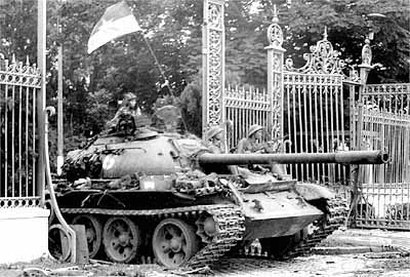The Fall of Saigon

North Vietnamese Tank crashing down the gates of the Peace Palace
After the Paris Peace Accords, the American soldiers were allowed to return home. However, tension remained between North and South Vietnam. Many of the Southern Vietnamese citizens were stricken with fear, because they predicted that their beloved Saigon would be attacked directly. On many occasions they had to leave everything behind them, including their homes and possessions, in order to obtain visas or passports in order to leave. So, were these frightened Southern Vietnam civilians right about the ambush of Saigon? On April 29th, before all of the American Soldiers even had the chance to withdraw, the general Nguyen Van Toan made the decision to invade and conquer the city, just like the Southerners expected. Saigon was hit by rockets and heavy artillery, destroying the only airport in Saigon. Conveniently, the Americans had a premeditated back up plan for escape. Henry Kissinger gave the order to the American troops to go through with "Operation Frequent Wind", a helicopter escape plan that included the American soldiers and their South Vietnam comrades deemed "friendly". This escape plan led to the largest helicopter evacuation in our entire history. The North Vietnamese continuously bombarded the city, and after one day of this horrific destruction, they were ready to make their final push into the city. However, before they could cause any more damage, the South Vietnamese President Duong Van Minh, who had only been in office for three days, despondently announced their surrender. He pleaded for a peaceful transfer of power in order to avoid bloodshed, but North Vietnamese didn't care, they invaded the city and occupied the areas of most importance in the city of Saigon, and raised their flag all over the presidential establishments. They arrested even broke down the gates of the peace palace and arrested Minh. On April 30th 1975, at 15:30, President Minh made this statement on a Radio Broadcast: "I declare the Saigon government...completely dissolved at all levels." The city of Saigon had officially fallen. The Vietnam War was finally over. The city was thereby renamed Ho Chi Minh City, after North Vietnam's source of inspiration, their Communist leader. The Fall of Saigon was a very important event because it marked not only the end of the Vietnam War, but the beginning of the formal reunification of Vietnam under Communist Rule. This tumultuous war had finally come to an end, and the macabre scene in Vietnam was at its close, at least for the most part.
